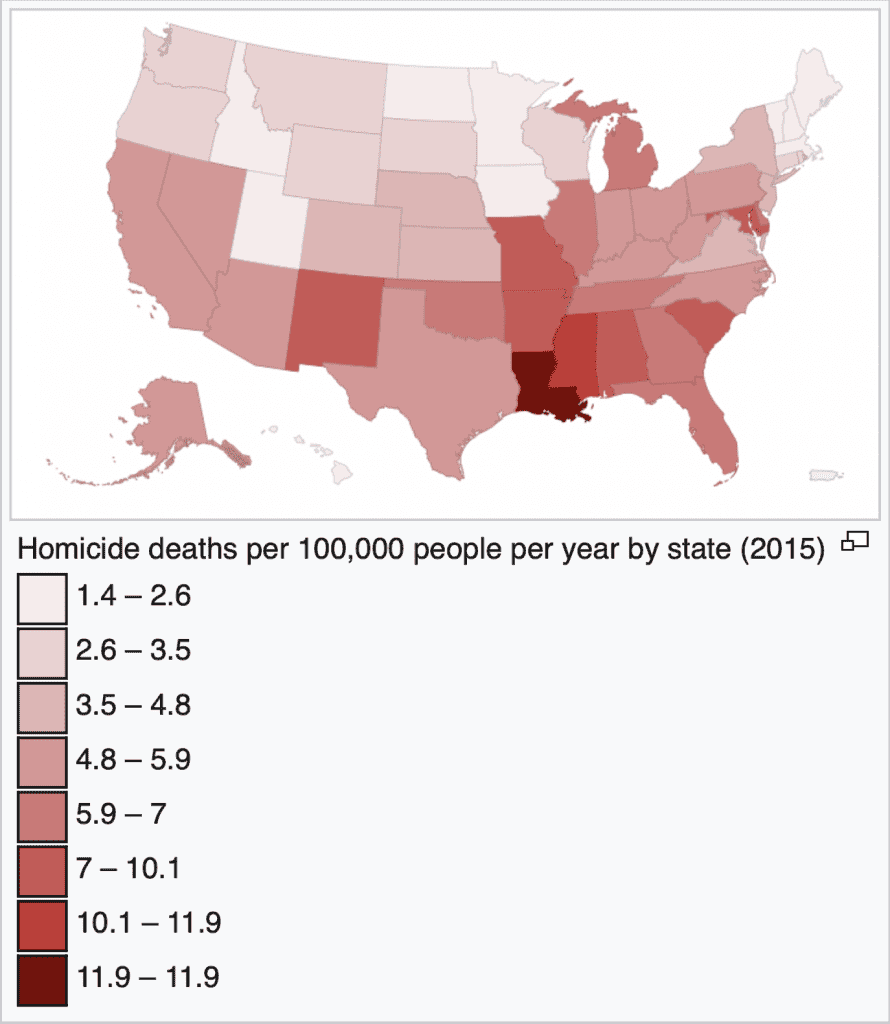SEPTEMBER 1, 2020 BY LIBBY ANNE
I saw a tweet recently that momentarily surprised me:
Top state for gun mortality is Louisiana. Top 10 are all red except I think NM. Illinois is like 25th. City with highest violent crime rate is Anchorage. Only blue city in top 10 is Detroit.
— Lil Semicolon (@PETEKEELEY) August 31, 2020
Top state for gun mortality is Louisiana? Say what now?
If you listen to the national discourse, you’d probably think blue cities like Chicago have the highest murder rates in the country. Because I’m not absent from the media ecosystem, I assumed that was true for a hot moment. Sure, would also tell you in a heartbeat that these large blue cities’ high murder rates were the result of a variety of factors, and that what these cities needed was better investment in jobs, schools, housing, and community programs, not more policing. But still! For a moment there, I forgot that these cities don’t actually have the highest murder rate.
Chicago only has the highest murder rate in the country if you look solely at the most populous cities and exclude all others. And even then, in a list of the 100 most populous cities in the U.S., Chicago is actually 10th on the list, after cities like Memphis, Tennessee, and Cleveland, Ohio. When you widen the net to look at all cities, the list of cities with higher murder rates than Chicago’s grows. Saginaw, Michigan. Jackson, Mississippi. Pine Bluff, Arkansas.
The effect is even bigger when you look at other categories of crime. Which cities have the highest rates of property crime? Middletown, Ohio. Miami Beach, Florida. Springfield, Missouri. Albuquerque, New Mexico. Burglary? Monroe, Louisiana. Santa Fe, New Mexico. Flint, Michigan. Cleveland, Ohio. Car theft? Irvington, New Jersey. Yakima, Washington. Richmond, California. Albuquerque, New Mexico.
A look at the violent crime rate by state certainly doesn’t suggest that blue states are more violent than red states. To the contrary.

Using 2018 data, the most violent states, in order, are Delaware, Louisiana, Missouri, Alaska, Maryland, New Mexico, Alabama, South Carolina, Tennessee, and Arkansas. If there is a pattern, it is that most of these states are in the U.S. South. States in New England, in contrast, are all at the bottom of the list.
Here’s another interesting question: which counties are most or least violent? Looking at cities, after all, excludes rural areas. The counties with the highest murder rate between 2009 and 2015 were:
1. ORLEANS PARISH, LOUISIANA (New Orleans)
2. COAHOMA COUNTY, MISSISSIPPI, population 16,000
3. PHILLIPS COUNTY, ARKANSAS, population 22,000
4. ST. LOUIS CITY, MISSOURI (TIE) (St. Louis)
4. BALTIMORE CITY, MARYLAND (TIE) (Baltimore)
6. PETERSBURG CITY, VIRGINIA, population 30,000
7. MACON COUNTY, ALABAMA (TIE), population 21,000
7. DISTRICT OF COLUMBIA (TIE) (Washington, D.C.)
9. WASHINGTON COUNTY, MISSISSIPPI (TIE), population 50,000
9. DALLAS COUNTY, ALABAMA (TIE), population 40,000
Note that while some of these counties are home to large cities, others are far more rural. Note also that all of these counties are in the U.S. South (yes, I did just put St. Louis in the South, but, as a point of order, Missouri was a slave state and its government seceded from the Union and joined the Confederacy).
It’s almost like violent crime rates are related to a variety of factors including things like poverty rates and cultural norms about violence and the resolution of conflict. It’s almost like crime should be treated fundamentally as a sociological reality and not as a political football. It’s almost like we live in a country with a fascist government that is more interested in using propaganda to scare people than it is in solving problems.
No comments:
Post a Comment